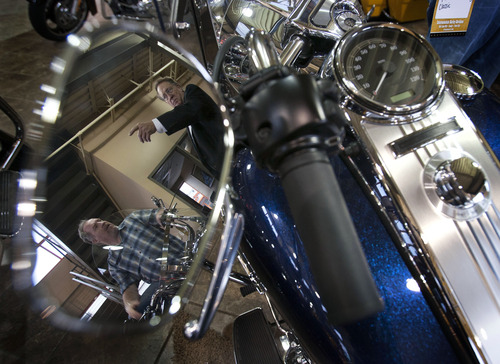This is an archived article that was published on sltrib.com in 2012, and information in the article may be outdated. It is provided only for personal research purposes and may not be reprinted.
They're derisively called brain buckets, donor domes and open casket insurance, but studies show that motorcycle helmets can save lives.
The real resistance has arisen when states tried to mandate that riders wear a helmet, a fight that will again be waged when the Utah Legislature convenes next month.
Sen. Todd Weiler, R-Woods Cross, says too many motorcycle riders who get into accidents end up needing government assistance, and there is a compelling reason for Utah to enact a mandatory helmet law.
"They end up on the public dime, so you should care about it," said Weiler, who is having a helmet law drafted and plans to present it to his colleagues. "Why should we be subsidizing these people's stupidity?"
But for many riders, being forced to wear a helmet contradicts the whole spirit of the freedom of the open road.
"We like safety, but we view it as a freedom of choice or civil liberty, the right to decide," said Steve Thompson, CEO of the group ABATE Utah, short for American Bikers Aiming Toward Education.
Thompson's group has opposed past attempts to enact a Utah helmet law and plans to resist Weiler's effort as well.
Thompson said rider education is a more effective safety measure and contends that motorcycle crashes are responsible for far fewer traumatic brain injuries than car crashes. His group worked with the Utah Department of Highway Safety on a billboard campaign promoting rider safety, which he said was effective.
"We're not anti-helmet, we're just pro-choice and we believe in safety," he said. "Helmets aren't going to stop us from crashing. ... What I believe the Legislature should be working on is not safer crashes, but let's reduce the crashes. Let's make people more aware."
Through the middle of October, 28 motorcyclists died in crashes on Utah roads this year, the same number that were killed in all of 2011 and up from 21 fatalities in 2010. Ten riders killed this year did not wear a helmet, compared to 18 last year.
Over the past decade, 61 percent of the approximately 290 people killed in Utah motorcycle wrecks were not wearing a helmet.
A study by the Centers for Disease Control and Prevention (CDC) said helmet use reduces the risk of death in an accident by 37 percent, and reduces the risk of head injury by 69 percent. The study said there is broad compliance with helmet laws. Nineteen states and the District of Columbia have a so-called "universal law" on the books requiring all motorcyclists to wear helmets.
Utah law only requires riders under the age of 18 to wear a helmet. The CDC estimated that partial helmet law saved 10 lives in 2010.
In 2009, Utah lawmakers on the House Transportation Committee voted unanimously to kill a bill that would have required all riders to wear a helmet.
Weiler said he won't push forward with his bill unless he has support from his Senate colleagues.
Brad Freckleton said he feels like he is a safer, more aware rider when he straps on his helmet.
"I've got five grandkids I want to stick around for and the helmet just makes me more conscientious," he said.
Some might object to being told they have to wear a helmet, Freckleton said, but people driving cars have to wear a seat belt for safety and a helmet law would be similar.
Freckleton said his neighbor's son who wasn't wearing a helmet was killed in a motorcycle crash, and his friend still wonders if a helmet could have saved his life.
"To me, I'd rather be a statistic on the positive side than a statistic on the negative side," said Freckleton. "I wore a helmet when I played baseball and cars are coming a lot faster than baseballs."
Bruce Armstrong said he got a full helmet with a face guard when he got his bike, mostly to make his wife happy. Now he rarely wears it unless it is raining or cold, he said, because it cuts down on his ability to hear and see traffic around him, especially when he is riding in the city.
"I understand people want you to be safe, but I'd much rather be able to hear and see. [A helmet] cuts you off from your surroundings," Armstrong said. "I hate 'em. I wear a backward baseball cap to keep the sun off my neck and that's it."
Twitter: @RobertGehrke —
Utah motorcycle deaths
2002 • 18 killed, 13 no helmet (72.2 percent)
2003 • 22 killed, 17 no helmet (77.3 percent)
2004 • 31 killed, 23 no helmet (74.2 percent)
2005 • 23 killed, 18 no helmet (78.3 percent)
2006 • 24 killed, 15 no helmet (62.5 percent)
2007 • 33 killed, 14 no helmet (42.4 percent)
2008 • 36 killed, 23 no helmet (63.9 percent)
2009 • 30 killed, 18 no helmet (60 percent)
2010 • 21 killed, 11 no helmet (52.4 percent)
2011 • 28 killed, 18 no helmet (64.3 percent)
2012* • 28 killed, 10 no helmet (35.7 percent)
* Through Oct. 15
Source: Utah Department of Public Safety



